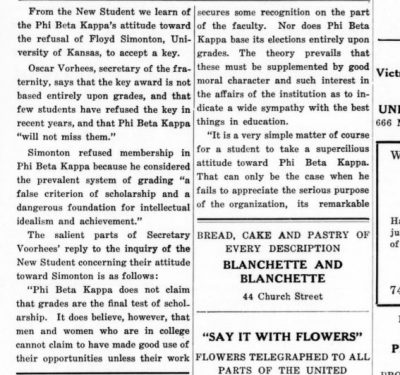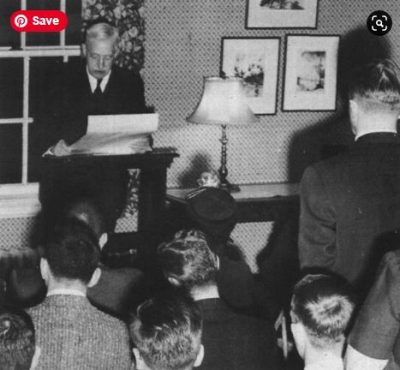Phi Beta Kappa, the nation's oldest and most prestigious undergraduate honors organization, was founded on December 5, 1776, at the College of William and Mary in Williamsburg, Virginia. It was the first society to have a Greek letter name, and in its initial period at William and Mary it introduced the essential characteristics of such societies - an oath of secrecy (discarded in 1831), a badge, mottoes in Latin and Greek, a code of laws, and an elaborate form of initiation.
Regular meetings were held at which chief attention was given to literary exercises, especially to composition and debating. Fraternal sentiments were fostered, occasional meetings were held for social purposes, and anniversaries were celebrated in the Apollo Room of the Raleigh Tavern, as they are again now that the College of William and Mary has recreated the Apollo Room in the Phi Beta Kappa Hall on the Williamsburg campus.
The original Phi Beta Kappa Society had an active life of only four years, ending when the approach of the British army under Cornwallis forced the college to close its doors. But the faith of those youthful scholars in the permanence and future greatness of their Society is shown by their preparation of charters for branches in other colleges. The two charters voted upon and granted during that period went to Harvard, December 4, 1779, and to Yale, four days later. The charters were delivered to groups in New Haven and Cambridge the following year and subsequently the Alpha of Connecticut was established at Yale (November, 1780) and the Alpha of Massachusetts came into being at Harvard (September, 1781).
While the Alpha of Virginia at the College of William and Mary was inactive between 1780 and 1851 and again from early in the Civil War until 1893, the Alpha at Harvard has had an uninterrupted existence and the Alpha at Yale has been inactive only from 1871 to 1884. These two chapters largely determined the permanent character of Phi Beta Kappa and shaped its policy in the establishment of other new chapters.
The two New England branches preserved the essential qualities of the Virginia experience, adopting some changes in procedure to suit local conditions. Shortly before the close of the college year, the members selected from the junior class a small group of leading students who in the following year constituted the "immediate society." The continuing custom of annual anniversary celebrations led to many significant contributions to American prose and poetry. Ralph Waldo Emerson delivered an oration at Harvard's 1837 celebration entitled "The American Scholar" later adopted as the name of Phi Beta Kappa's quarterly journal.
Fifty years after the Society's extension into New England, only four additional chapters had been founded: Alpha of New Hampshire at Dartmouth in 1787; Alpha of New York at Union in 1817; Alpha of Maine at Bowdoin in 1825; and Alpha of Rhode Island at Brown in 1830. In each case, the new charters were granted by the concurrent action of the Alphas already chartered.
Fifteen additional chapters were established in the succeeding 30 years. By 1883 at the time of the founding of the United Chapters of Phi Beta Kappa, which provided a unified organization for the Society, 25 chapters had been chartered, although not all were active, and about 14,000 persons had been elected to membership.
Three important changes marked the first century of Phi Beta Kappa's history. The anti-Masonic agitation of the 1820s led to much discussion at Dartmouth, Harvard, and Yale of the Phi Beta Kappa oath. In 1831, the Alpha at Harvard was the first chapter to remove the requirement of secrecy. By the time the United Chapters were organized in 1883, the last vestiges of secrecy disappeared.
A second change was more fundamental. Originally Phi Beta Kappa had been a society of congenial spirits, similar in its basis of membership to the present-day fraternity, and in the character of its meetings to a debating or literary club. As time passed, it tended more and more to become an "honor" society, existing to recognize and to foster excellence in liberal learning at the undergraduate level.
Another necessary development was the admission of women. The Alpha at the University of Vermont, finding in 1875 that two women had met the scholastic requirements, admitted them to membership. The following year, four women were elected by the Gamma of Connecticut at Wesleyan. This step, regarded in some quarters as revolutionary, aroused no formal protest. A few years later, when a general constitution and bylaws were adopted, the right of women to membership was accepted without question.
In 1881 there were only 20 active chapters - with the exception of three in Ohio, all were situated east of the Alleghenies and north of the Mason-Dixon line. At the centennial celebration of the Alpha of Massachusetts on June 30 of that year, to which the other chapters had been invited to send representatives, a proposal was made by the delegate from Hobart to effect a closer union. After consideration then and in later meetings, a constitution was prepared, adopted, and ratified and on September 5,1883 the first National Council of the United Chapters of Phi Beta Kappa began its sessions. A revision to the constitution in 1937 strengthened this union, at the same time safeguarding the rights and liberties of the individual chapters.
In the years since the organization of the United Chapters, the number of chapters has increased from 25 to 255, and the membership has grown accordingly. In 1900, when the first general catalogue was published, the living membership was about 10,500. Today it is more than 500,000.
As the organization acquired a truly national character and some of its members created off-campus Phi Beta Kappa associations to foster the Society's educational mission, it became increasingly clear that the term "United Chapters" no longer described the scope of Phi Beta Kappa's programs. In 1988 the delegates assembled at the 35th Council voted to change the organization's name to "The Phi Beta Kappa Society." This more inclusive designation, also the historic name of the Society, now appears on all of the organization's legal documents and publications
Turning to the local Epsilon chapter, although some arts and sciences courses had been taught in Storrs for years, the College of Liberal Arts and Sciences was not established until 1939, when Connecticut State College was turned into the University of Connecticut. As early as 1942, interest in the establishment of a Phi Beta Kappa chapter was evinced when two informal meetings of Phi Beta Kappa faculty members were held. But nothing further could be done because of the war. Then, in 1948, an inquiry was made to the United Chapters, and in 1949 the petitioning faculty members submitted a preliminary statement. At that time, there were 27 Phi Beta Kappa members in the Arts and Sciences faculty, 13 in other schools and divisions at Storrs, and 12 in the regional campus and the Law School of the University. The students in the whole University numbered 8,420, with 458 full-time faculty. Alas, as happens to most applicants on their first try, the Committee on Qualifications did not select the University of Connecticut for further study. In general, the University and especially the College of Liberal Arts and Sciences were regarded as too new and unproven. In particular, no Latin or Greek was offered; Art was taught in the School of Home Economics; and most Arts and Sciences departments were housed in temporary structures or in the basements of Holcomb Hall and the Library.
Three years later, when these defects had been remedied, the Phi Beta Kappa members decided to reapply. Another preliminary statement was prepared and submitted in November 1952. This time the Committee on Qualifications responded favorably, and a massive General Report was prepared in 1953. Then came an inspection visit by a representative of the Committee on Qualifications, Professor Edward C. Kirkland of Bowdoin College, a sympathetic and genial gentleman. AS a result of his visit, the Committee recommended the University of Connecticut's application for favorable consideration by the 1955 Triennial Council. The Council did indeed grant the charter, and the Epsilon Chapter of Connecticut was installed on April 4, 1956. The installing officer was the then President of the United Chapters, Dr. William T. Hastings, Professor Emeritus of English at Brown University. After the initiation of 16 seniors and two junior members in course, the new chapter began its life with 85 members, including 33 charter members in the College of Liberal Arts and Sciences and 34 in other schools and divisions.
UConn PBK – Looking Back

PBK made the news a couple of times in the early & mid 20th century. A Connecticut Campus (predecessor to the Daily Campus) mention in 1926 (see page 9) shares shock that a student at U Kansas should refuse "the key"! The perceived elitism of Phi Beta Kappa has been a focus of the organization in recent years, which has increased its efforts in using its resources to increase access to education for all (not just PBK) students.
A 2013 UConn Today article looked back at the chapter's founding in 1956 (a membership delayed by the national chapter's unwillingness in previous years to consider an institution that lacked a Latin and Greek program - and was deemed weak in "liberal studies" - a world away from the current scholarly output and educational impact of UConn's College of Liberal Arts & Sciences!).
